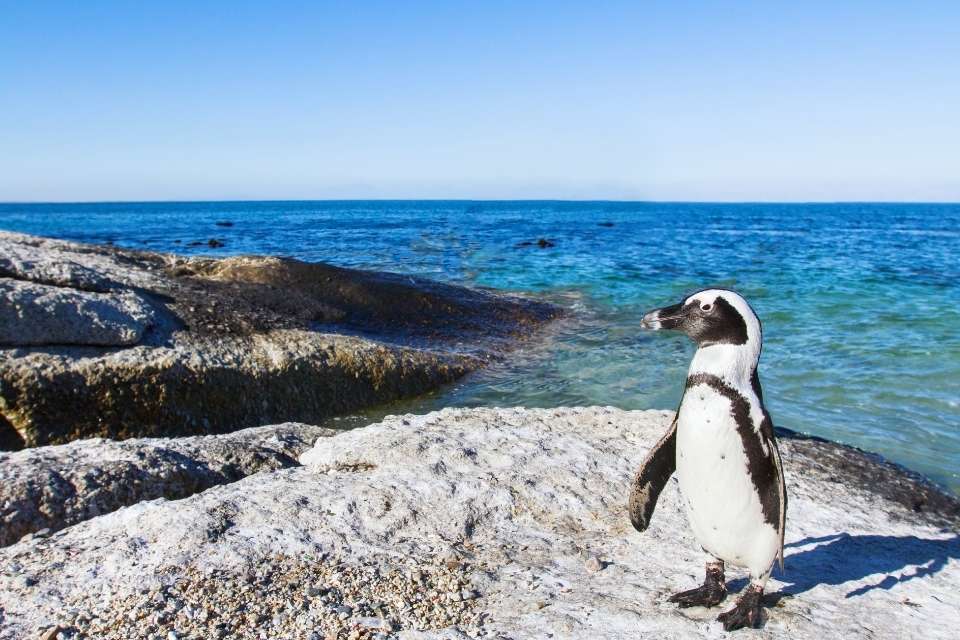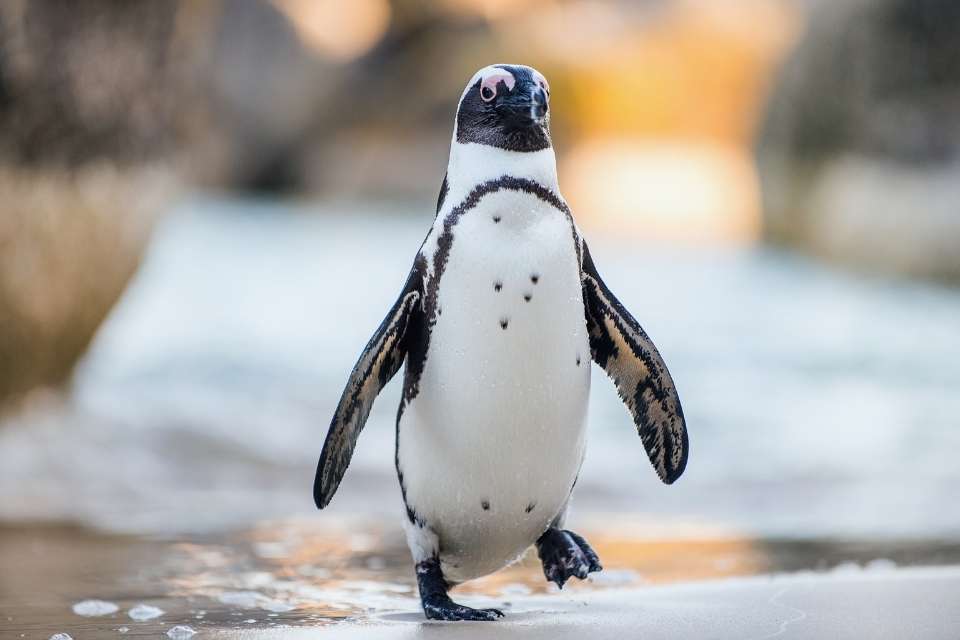In the mesmerizing world of penguins, have you ever wondered if they fear us, humans?
These flightless birds, known for their charming waddle and gentle demeanor, often exhibit a surprising lack of fear towards us. Penguins, mainly found in the Southern Hemisphere, possess an innate curiosity that draws them towards humans in their natural habitats.
Indeed, penguins have no natural land predators, which may contribute to their fearlessness.
However, it’s essential to remember that penguins are still wild animals, and they can become unexpectedly aggressive if they feel threatened or provoked.
Human activities, such as invasive approaches or disturbances in their habitats, can impact penguin behavior, leading to fear responses.
Despite their potential fearless nature, it’s crucial to approach penguins with caution and respect, thereby ensuring harmonious interactions between humans and these extraordinary creatures.
Key Takeaways:
- Penguins often lack fear of humans and display curiosity towards us in their habitats.
- Caution is necessary as penguins are wild animals and can become hostile if disturbed or threatened.
- Human activities can impact penguin behavior, leading to fear responses.
- Respecting penguins’ boundaries is crucial for their well-being and maintaining a harmonious coexistence.
- Conservation efforts are paramount to protect penguins and their habitats from human-induced disturbances.
The Affectionate Nature of Penguins
Penguins are fascinating creatures that exhibit an affectionate nature towards humans. Their lack of fear makes them approachable and curious, often leading to interactions with humans in their natural habitats.
Penguins seem to genuinely enjoy the presence of humans and show a friendly demeanor.
However, it is important to approach penguins with caution and respect. Sudden movements or loud noises may startle them, causing them to retreat into the safety of their environment.
We must be mindful of their comfort and observe them from a distance, allowing them to maintain their natural behavior.
“Penguins are intelligent and curious animals. They often approach humans with genuine interest and curiosity, exploring their surroundings and exhibiting friendly behavior,” says marine biologist Dr. Lisa Johnson. “It’s a unique experience to witness their natural curiosity and their lack of fear towards humans. However, it is essential that we do not invade their personal space and respect their boundaries.”
Friendly Encounters with Penguins
- Keep a safe distance: While penguins may approach humans, it is crucial to maintain a respectful distance to avoid causing them any distress. Observing them from afar ensures their comfort and safety.
- Do not touch or pet: Although it may be tempting to interact physically with penguins, it is important to remember that they are still wild animals. Touching or petting them can disrupt their natural behavior and may even lead to stress or aggression.
- Observe their behavior: Watching penguins in their natural habitat can provide valuable insights into their social dynamics and daily routines. Take the time to observe their interactions with each other and their environment.
We have a unique opportunity to appreciate the affectionate nature of penguins and witness their friendly interactions with humans.
By respecting their boundaries and observing them from a distance, we can ensure a positive and harmonious relationship with these incredible creatures.
Penguins as Pets
Penguins are fascinating creatures, known for their adorable waddle and playful demeanor. It’s no wonder that some people may be tempted to keep these lovable birds as pets. However, there are important factors to consider before making such a decision.
The Social Nature of Penguins
One of the main reasons why penguins are not suitable as pets is their highly social behavior. Penguins thrive in large colonies, interacting and relying on each other for companionship and survival.
Keeping a penguin as a pet would deprive them of this vital social structure, leading to loneliness and potential health issues.
“Penguins are highly social animals, relying on their colony for emotional well-being and mutual support.” – Dr. Jane Wilson, Penguin Specialist
Specialized Care Requirements
Properly caring for a penguin goes beyond providing food and shelter. These unique birds require a specialized environment to thrive. Penguins are adapted to cold climates and depend on icy waters as their natural habitat.
Maintaining the low temperatures necessary for their well-being can be extremely challenging in a domestic setting.
In addition, penguins have specific dietary needs that must be met. Their diet primarily consists of fish, which must be sourced and prepared carefully to ensure their nutritional requirements are met.
Legal Considerations
It’s important to note that penguins are protected species in many regions, including South Africa. Owning a penguin as a pet is illegal and can result in severe penalties.
This legal protection is in place to preserve the natural habitats of penguins and prevent their exploitation.
Instead of keeping penguins as pets, we can appreciate and admire these incredible creatures from a respectful distance.
Visiting reputable wildlife sanctuaries and conservation centers provides the opportunity to observe penguins in their natural habitats, promoting their well-being while contributing to their conservation efforts.
- Penguins are highly social animals that require a large group for their mental well-being.
- They need specialized care, including maintaining low temperatures and providing a diet of fish.
- Keeping penguins as pets is illegal in many regions, as they are protected species.
Let’s cherish and protect penguins in their natural habitats, where they can live fulfilling lives as wild animals.
Understanding Penguin Behavior
Like other birds, penguins have the ability to experience and express emotions. They can show signs of loneliness, hunger, affection, and even aggression. However, their communication methods differ from those of humans.
Penguins use vocal calls and physical gestures to convey their intentions and emotions. For example, when a penguin offers a smooth pebble to its mate, it is a sign of affection and courtship.
These gestures play an important role in their social interactions within their colonies.
When encountering humans, penguins can display curiosity and may approach to investigate their presence. It is fascinating to observe their behavior and the way they interact with us.
However, it is crucial to remember that penguins are still wild animals and should be respected from a distance.
Paying attention to penguin body language is key to ensuring a positive interaction. When a penguin feels threatened or uncomfortable, it may exhibit signs of distress such as flapping its wings, hissing, or making vocal calls.
These behaviors are indications that the penguin wants to maintain its boundaries and should be given space.
By understanding and respecting penguin behavior, we can coexist harmoniously with these fascinating creatures and appreciate their uniqueness in their natural habitats.
Conservation and Threats to Penguins
Penguins face numerous threats in their habitats, largely as a result of human activities. Throughout history, hunting and egg collection have had severe impacts on certain penguin populations.
Today, penguins continue to be at risk due to habitat destruction, competition with fishermen for food sources, and the introduction of predators into their environments.
Moreover, climate change, primarily caused by human actions, is having a particularly detrimental effect on penguin populations, especially those in Antarctica.
To address these challenges and protect these beloved birds and their habitats, significant efforts are underway in penguin conservation.
Organizations and governments around the world are actively working to preserve penguin populations and their ecosystems.
Through initiatives such as the establishment of protected areas, monitoring and research programs, and public awareness campaigns, strides are being made to mitigate the human impact on penguins and ensure their long-term survival.
Conclusion
Throughout this article, we have explored the intricate dynamics of the penguin-human interaction. Penguins, with their lack of fear and affectionate nature, can display friendly behavior towards humans in certain circumstances.
However, it is crucial to approach these magnificent creatures with respect and give them the space they need to thrive in their natural habitats.
Human actions play a significant role in shaping penguin behavior and can have far-reaching consequences for their survival.
Conservation efforts are essential to protect these charismatic birds and address the potential conflicts that may arise between penguins and humans. By prioritizing penguin conservation, we can ensure the long-term well-being and coexistence of both species.
Penguins are highly susceptible to the threats posed by human activities. From habitat destruction to competition for resources and the impacts of climate change, these challenges endanger penguin populations worldwide.
To mitigate the penguin-human conflict, proactive measures are necessary, including habitat preservation, sustainable fishing practices, and the reduction of greenhouse gas emissions.
By raising awareness, promoting responsible tourism, and supporting conservation initiatives, we can contribute to the preservation of penguins and their habitats.
Let us work together to secure a future where penguins and humans coexist harmoniously, fostering a world of appreciation and admiration for these remarkable creatures.
FAQ
Do penguins fear humans?
Penguins, known for their curiosity and lack of fear towards humans, generally do not fear humans. They may approach and interact with humans in their habitats.
How do penguins behave towards humans?
Penguins are generally friendly and exhibit curiosity towards humans. They may approach and investigate human presence. However, sudden movements or loud noises can startle them, causing them to retreat.
Can penguins be kept as pets?
Penguins are not suitable as pets. They are social animals that require a large group for their mental well-being. Keeping penguins as pets also requires specialized care and is illegal in many regions.
Do penguins express emotions?
Like other birds, penguins can experience and express emotions. They may display actions such as loneliness, hunger, affection, and even aggression. They communicate through vocal calls and physical gestures.
What threats do penguins face?
Penguins face threats such as habitat destruction, competition with fishermen for food, introduced predators, and climate change. Human activities have a significant impact on penguin behavior and the survival of their populations.
Why is penguin conservation important?
Penguin conservation is crucial to protect these beloved birds and their habitats. Efforts are being made to ensure the long-term well-being and coexistence of penguins and humans in their natural habitats.


